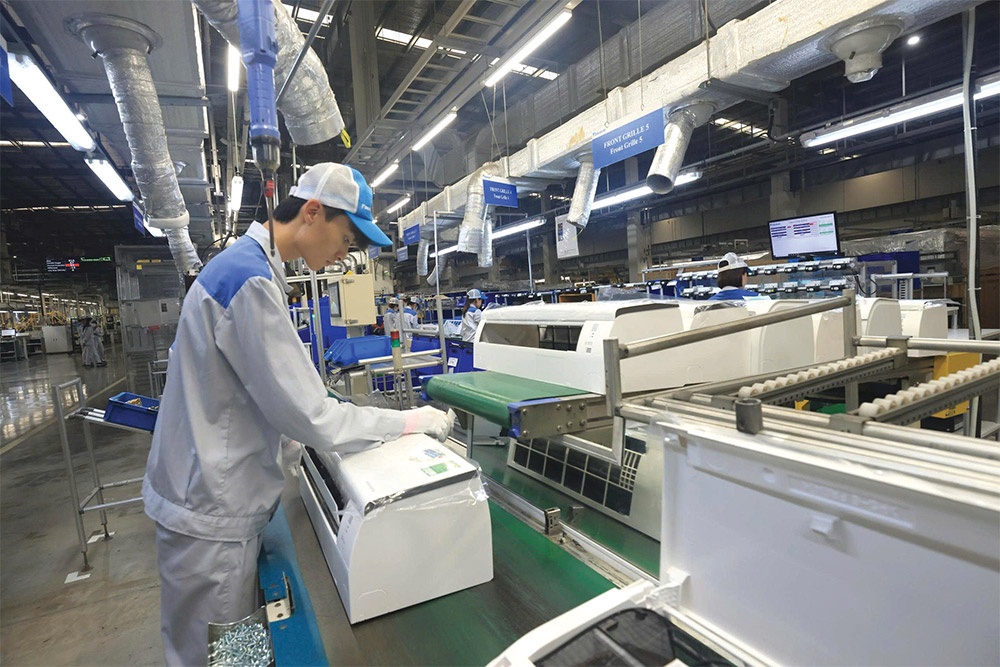 |
| The bulk of financing for cooling solutions must come from private funds, photo Duc Thanh |
After the initial success of piloted sustainable cooling models in several localities in Vietnam, the Department of Climate Change (DCC) under the Ministry of Agriculture and Environment, in collaboration with international organisations, is trying to expand sustainable cooling models in other localities.
“In the process of researching the cooling practice projects for other urban areas, we offer a list of nearly 10 potential projects. These projects have been carefully evaluated in terms of technology and finance, and also include proposals for cooling solutions,” said Nguyen Dang Thu Cuc, deputy head of the GHG Emission Management and Ozone Layer Protection Division under the DCC, at a Hanoi event on the issue on August 28.
However, Cuc said, it can only provide technical support, and financial resources are needed to implement these projects. Its partner, the United Nations Environmental Programme (UNEP), is also looking for more units that can provide additional funding, so that new projects can be quickly implemented.
“Banks and financial institutions are responsible for providing concessional loans, support funds, and credit guarantees. Green credit offers preferential loans for energy efficiency projects, lowering capital costs and improving financial accessibility,” Cuc added. “Meanwhile, guarantee mechanisms apply public-private financing and state guarantees to share risks with investors. By the way, enterprises and investors can access capital to deploy sustainable cooling technologies and solutions.”
Since 2022, the DCC, in coordination with the UNEP and Global Green Growth Institute (GGGI), has piloted sustainable cooling models in several localities such as Can Tho, Danang and Quang Tri. This project provided a tangible pathway to accelerate these efforts, moving Vietnam closer to the country’s ultimate goal of achieving net-zero emissions by 2050. The data and evidence gathered from pilot cities will be crucial for informing and strengthening future Nationally Determined Contributions (NDCs), Cuc said.
According to the DCC, cooling practices are essential for public health, productivity, and sustainable development in the context the climate change is causing global weather to heat up rapidly. They also offer up an economic opportunity. Analysis from the International Finance Corporation and UNEP, published in September last year, finds that the market for sustainable cooling in developing economies is set to more than double over the next 25 years, from around $300 billion in annual demand currently. Most of this will be attributed to active cooling.
“While demand for sustainable cooling solutions in developing countries will bring that $600 billion business opportunity to the private sector by mid-century, governments, regulators, and multilateral financial institutions have a critical role to play in creating an enabling environment to make sustainable cooling more attractive to investors,” Benjamin Hickman, senior programme manager from the UNEP Cool Coalition, said at the August 28 event.
“Vietnam is streamlining financing channels and mobilising mechanisms to scale up sustainable, efficient, and affordable cooling for all. The project made significant progress in leveraging a strong partnership with the Vietnam Environment Protection Fund (VEPF) to build capacity on mainstreaming cooling and to identify investment pipelines to unlock finance,” Hickman added.
In 2022, Vietnam became one of the first countries to integrate cooling into its NDCs and net-zero strategy, with a focus on extreme urban heat and the role of nature-based and passive cooling solutions. Vietnam also signalled its global commitment by joining the Global Cooling Pledge at COP28.
Promulgated in 2024, Vietnam’s national plan on management of ozone-depleting substances and greenhouse gases serves as a strategic roadmap for advancing the Global Cooling Pledge, aligning national action with international commitments to phase down harmful emissions while promoting sustainable and equitable access to cooling.
Significantly, Decree No.119/2025/ND-CP incorporated the concept of ‘sustainable cooling’ for the first time into the legal system, laying a foundation for long-term policy implementation.
“We have actively supported the Vietnamese government in laying the groundwork for a favourable policy and financial environment,” said Maria Cecilia Pana, deputy country representative of the GGGI. “This includes exploring innovative financing mechanisms and building a stronger partnership with organisations like the VEPF.”
As a developing country, mobilising domestic and international resources is critical for scaling up these solutions, and this project has made significant progress in identifying investment pipelines to unlock private finance, Pana explained.
“We must continue to work together to mobilise finance, engage the private sector, and build a robust policy and regulatory environment that can support a nationwide green cooling transition,” Pana added. “The bulk of the financing for this transition must come from private investment, and our future efforts will need to focus on streamlining financing channels and mobilising mechanisms to scale up sustainable, efficient, and affordable cooling for all.”





